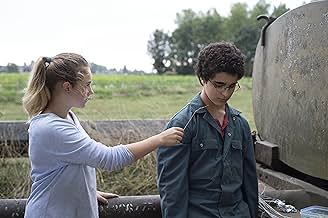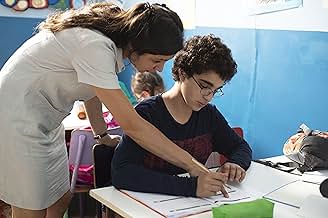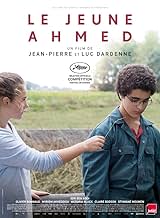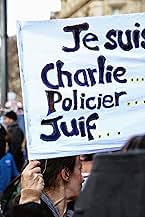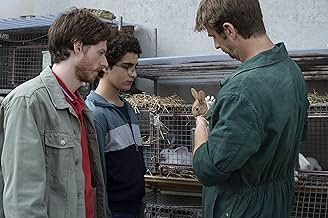AVALIAÇÃO DA IMDb
6,6/10
4,9 mil
SUA AVALIAÇÃO
Um adolescente belga trama um plano para matar seu professor depois de adotar uma interpretação extremista do Corão.Um adolescente belga trama um plano para matar seu professor depois de adotar uma interpretação extremista do Corão.Um adolescente belga trama um plano para matar seu professor depois de adotar uma interpretação extremista do Corão.
- Direção
- Roteiristas
- Artistas
- Prêmios
- 5 vitórias e 12 indicações no total
Eva Zingaro
- Psychologue du centre
- (as Eva Zingaro-Meyer)
- Direção
- Roteiristas
- Elenco e equipe completos
- Produção, bilheteria e muito mais no IMDbPro
Avaliações em destaque
Summary
In the current context of the resurgence of neo-fascism and with a World Cup about to be held in a misogynistic and homophobic Islamic theocracy, it is opportune to see the 2018 film in which the Dardenne brothers bravely tackled Muslim youth fundamentalism, establishing a successful cross between the psychology of the solitary leading character, the context in which he moves and certain precepts of Islam, without this being relativized or blurred.
The women act as disturbers, opponents and challengers of Islam's religious and macho misogyny embodied in the impenetrable, resolute, fanatical and tenacious teenager Ahmed, a young out-of-place radical for whom violence ends up being as natural as it is inevitable.
Review
The film follows Ahmed, a Muslim teenager from a Belgian village, who does not hesitate to resort to violence based on his interpretation of the imam's teachings on him and the Koran.
This time the Dardenne brothers face a thorny issue, and they do it frankly and without fear. I say without fear because they do not fear that by addressing the issue of Islamic fundamentalism they will be branded as Islamophobes.
The film rightly establishes a cross between the psychology of the character, the context in which he moves and certain precepts of Islam, but without this being relativized or blurred by the former. They are three dimensions that enhance each other.
There is an inevitable clash (and some irony) between the secularism of the Belgian public school and the objections of some Muslim parents who oppose for religious reasons the proposals of Ahmed's teacher of Arab origin.
An important aspect that went unnoticed by the critics is the centrality in the history of women as threats, opponents and challengers of Islam's religious and sexist misogyny, as representatives of evil that must be avoided, combated and even eliminated. It is the female figures (the mother, the sister, his teacher Inés and another that I will not reveal) who assume the destabilizing role of an Ahmed who combines his fear of female contact with a religious precept that demonizes him, while the Imam Youssuf assumes the role of the absent father, guarantor of the rules, whose teachings the young man combines with those of a religious leader who follows the web.
Another interesting aspect is that The Young Ahmed does not follow the process of religious radicalization of the adolescent, but rather the character is already approached with such a degree of fanaticism that it only remains for him to take him to the field of a violence that is as natural as it is inevitable for him. On the other hand, he is illustrative of how the system faces and seeks to redirect these situations, emphasizing respect and containment.
The Dardenne resort to their usual dry tone, with handheld camera moments that reinforce a realism supported by the presence of actors unknown to the general public. Idir Ben Addi assumes the difficult and at times unpleasant role of an impenetrable, determined, fanatical and tenacious adolescent, with an opacity that sustains an unpredictability that adds elements of a thriller to the psychological and social drama, in a story that is even more disturbing to present to us. To an unincorporated fundamentalist who acts completely on his own.
In the current context of the resurgence of neo-fascism and with a World Cup about to be held in a misogynistic and homophobic Islamic theocracy, it is opportune to see the 2018 film in which the Dardenne brothers bravely tackled Muslim youth fundamentalism, establishing a successful cross between the psychology of the solitary leading character, the context in which he moves and certain precepts of Islam, without this being relativized or blurred.
The women act as disturbers, opponents and challengers of Islam's religious and macho misogyny embodied in the impenetrable, resolute, fanatical and tenacious teenager Ahmed, a young out-of-place radical for whom violence ends up being as natural as it is inevitable.
Review
The film follows Ahmed, a Muslim teenager from a Belgian village, who does not hesitate to resort to violence based on his interpretation of the imam's teachings on him and the Koran.
This time the Dardenne brothers face a thorny issue, and they do it frankly and without fear. I say without fear because they do not fear that by addressing the issue of Islamic fundamentalism they will be branded as Islamophobes.
The film rightly establishes a cross between the psychology of the character, the context in which he moves and certain precepts of Islam, but without this being relativized or blurred by the former. They are three dimensions that enhance each other.
There is an inevitable clash (and some irony) between the secularism of the Belgian public school and the objections of some Muslim parents who oppose for religious reasons the proposals of Ahmed's teacher of Arab origin.
An important aspect that went unnoticed by the critics is the centrality in the history of women as threats, opponents and challengers of Islam's religious and sexist misogyny, as representatives of evil that must be avoided, combated and even eliminated. It is the female figures (the mother, the sister, his teacher Inés and another that I will not reveal) who assume the destabilizing role of an Ahmed who combines his fear of female contact with a religious precept that demonizes him, while the Imam Youssuf assumes the role of the absent father, guarantor of the rules, whose teachings the young man combines with those of a religious leader who follows the web.
Another interesting aspect is that The Young Ahmed does not follow the process of religious radicalization of the adolescent, but rather the character is already approached with such a degree of fanaticism that it only remains for him to take him to the field of a violence that is as natural as it is inevitable for him. On the other hand, he is illustrative of how the system faces and seeks to redirect these situations, emphasizing respect and containment.
The Dardenne resort to their usual dry tone, with handheld camera moments that reinforce a realism supported by the presence of actors unknown to the general public. Idir Ben Addi assumes the difficult and at times unpleasant role of an impenetrable, determined, fanatical and tenacious adolescent, with an opacity that sustains an unpredictability that adds elements of a thriller to the psychological and social drama, in a story that is even more disturbing to present to us. To an unincorporated fundamentalist who acts completely on his own.
I don't really understand why this brilliant film was seen by critics as a minor piece of work by the brilliant two time Palm D'or winning Dardenne brothers. I was hooked throughout. Their last two films, The Unknown Girl and Two days, one night were almost universally seen as amongst their best work. Whilst I enjoyed both of those films, they didn't hit me emotionally like others Dardenne films, such as the kid with a bike or L'enfant. Young Ahmed did. Young Ahmed - superbly played by Olivier Bonnaud - is clearly a complex character caught in the middle between Western norms and his interpretation of Allah. He's certainly been led astray by the most fundamentalist of interpretations of the Quran, but you never quite know if he's playing the game, or is genuinely sorrowful for his actions. And the result is a quietly disquieting portrayal of what, for him, is right and wrong, loyal and disloyal, life and death. And, as is oft the case with the Dardennes, there's no obvious answers. A return to form from my go to European auteurs. 8 and a half out of ten.
Even as an agnostic who sees religion very critically, I'm baffled how irresponsibly the producers and directors fuel the fire of bigotry, with such an agenda driven film, in an already toxic political climate.
It's rather appalling how the movie tries to intentionally vilify a group of people, by regurgitating the same islamophobic tropes we have been hearing for 20+ years, while failing to maintain any nuance. How can a movie call for open mindedness while being bigoted and close minded itself?
In Belgium, the teenager Ahmed (Idir Ben Addi) lives with his family and has classes of French and Arabic languages with his teacher Inès (Myriem Akheddiou). However, he has been brainwashed by his Imam Youssouf (Othmane Moumen) with a wrong interpretation of the Koran, despite the warnings of his mother (Claire Bodson). Ahmed decides to kill Inès but fails and is arrested. While under the care of the State, he works at a farm and meets the young Louise (Victoria Bluck), who has a crush on him. But she is not Muslin, and Ahmed scorns her. The radical Ahmed has an agenda and flees from his social worker.
"Le jeune Ahmed", a.k.a. "Young Ahmed" (2019), is a Franco-Belgian production with a simple story of hatred. The movie shows an impressive demonstration of how teenagers may be manipulated and become fanatic by radicals. This is the case of the lead character Ahmed, who received and adopted a wrong interpretation of the Koran and is destroyed by his belief. My only question is why fanatics stay in the Western civilization, instead of returning to their home countries. This is the same case of fanatic racists that praise their mother land. Why they do not move back? My vote is six.
Title (Brazil): "O Jovem Ahmed" ("The Young Ahmed")
"Le jeune Ahmed", a.k.a. "Young Ahmed" (2019), is a Franco-Belgian production with a simple story of hatred. The movie shows an impressive demonstration of how teenagers may be manipulated and become fanatic by radicals. This is the case of the lead character Ahmed, who received and adopted a wrong interpretation of the Koran and is destroyed by his belief. My only question is why fanatics stay in the Western civilization, instead of returning to their home countries. This is the same case of fanatic racists that praise their mother land. Why they do not move back? My vote is six.
Title (Brazil): "O Jovem Ahmed" ("The Young Ahmed")
YOUNG AHMED
The justifiably renowned Dardenne Brothers won the Cannes Directing prize for YOUNG AHMED, but, it isn't one of their stronger films, despite some interesting thematic elements. Ahmed (Idir Ben Addi) is a teenage Muslim in Belgium who, under the influence of a radical Imam (Othmane Moumen ) becomes increasingly strict in his religious practices putting him at odds with the more open ways of his school and even his own family (neither his mother (Claire Bodson) or sister wear hijabs). When Ahmed puts his radical thoughts into action he is placed in a youth detention/rehabilitation center. It is there that the bulk of the brief 84 minute picture is set, and where Ahmed continues to struggle finding his way between his ultra-conservative and strict principles, and adapting to the modern world. Much of the criticism of the Dardennes has been that it doesn't provide enough answers about Ahmed. Throughout their distinguished careers, the brothers have never been ones to provide easy conclusions, they are most adept at posing questions and challenging the viewer. What keeps YOUNG AHMED from fully succeeding is that in their best work (ROSETTA, L'ENFANT) the directing team finds a way to provide a strong dramatic narrative to pose their queries. Here, Ahmed's tale, while well documented, fails to fully engage. The movie has moments, but, they are fleetingly effective.
The justifiably renowned Dardenne Brothers won the Cannes Directing prize for YOUNG AHMED, but, it isn't one of their stronger films, despite some interesting thematic elements. Ahmed (Idir Ben Addi) is a teenage Muslim in Belgium who, under the influence of a radical Imam (Othmane Moumen ) becomes increasingly strict in his religious practices putting him at odds with the more open ways of his school and even his own family (neither his mother (Claire Bodson) or sister wear hijabs). When Ahmed puts his radical thoughts into action he is placed in a youth detention/rehabilitation center. It is there that the bulk of the brief 84 minute picture is set, and where Ahmed continues to struggle finding his way between his ultra-conservative and strict principles, and adapting to the modern world. Much of the criticism of the Dardennes has been that it doesn't provide enough answers about Ahmed. Throughout their distinguished careers, the brothers have never been ones to provide easy conclusions, they are most adept at posing questions and challenging the viewer. What keeps YOUNG AHMED from fully succeeding is that in their best work (ROSETTA, L'ENFANT) the directing team finds a way to provide a strong dramatic narrative to pose their queries. Here, Ahmed's tale, while well documented, fails to fully engage. The movie has moments, but, they are fleetingly effective.
Você sabia?
- CuriosidadesThis movie was selected to compete for the Palme d'Or at the 2019 Cannes Film Festival, where it eventually won the Best Director Award, marking the first time the award was officially shared by a directing duo winning for a single film (although Joel Coen has won the award three times for movies he co-directed with his brother Ethan Coen where Ethan had to go uncredited per DGA rules).
- Trilhas sonorasDelay
Performed by Intergalactic Lovers
Principais escolhas
Faça login para avaliar e ver a lista de recomendações personalizadas
- How long is Young Ahmed?Fornecido pela Alexa
Detalhes
- Data de lançamento
- Países de origem
- Central de atendimento oficial
- Idiomas
- Também conhecido como
- Young Ahmed
- Locações de filme
- Rue Chapuis 37, Seraing, Liège, Wallonia, Bélgica(Graines de Génie tutoring school)
- Empresas de produção
- Consulte mais créditos da empresa na IMDbPro
Bilheteria
- Faturamento bruto nos EUA e Canadá
- US$ 21.291
- Fim de semana de estreia nos EUA e Canadá
- US$ 4.216
- 23 de fev. de 2020
- Faturamento bruto mundial
- US$ 1.522.606
- Tempo de duração1 hora 25 minutos
- Cor
- Proporção
- 1.85 : 1
Contribua para esta página
Sugerir uma alteração ou adicionar conteúdo ausente

Principal brecha
By what name was O Jovem Ahmed (2019) officially released in India in Hindi?
Responda
![Assistir a Bande-annonce [OV]](https://m.media-amazon.com/images/M/MV5BM2RiNjYyN2MtNTdhOC00MmQxLWIwYmItNzE1YjkyMjkxYTk0XkEyXkFqcGdeQXRyYW5zY29kZS13b3JrZmxvdw@@._V1_QL75_UX500_CR0)

